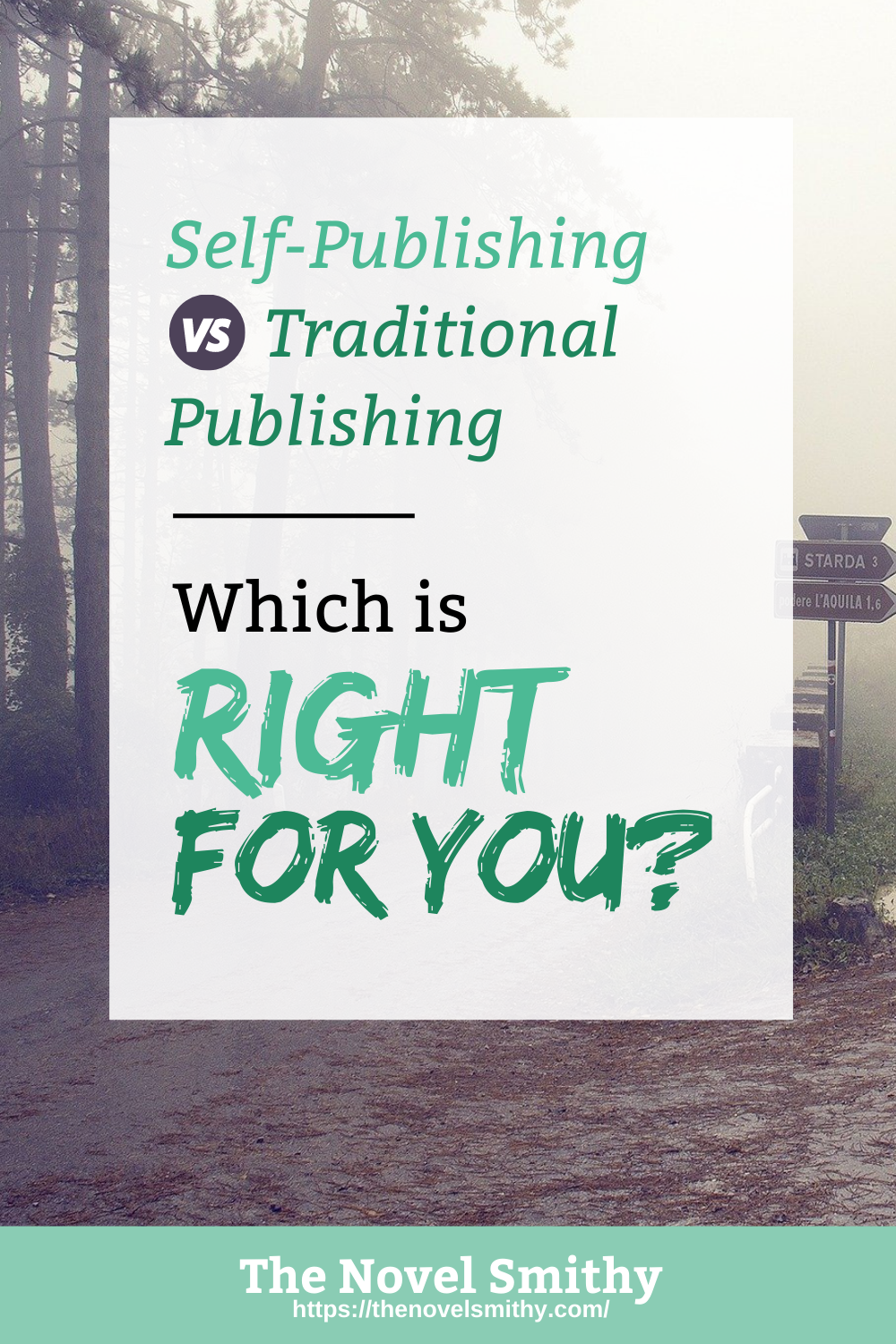Self-Publishing vs. Traditional Publishing: Which is Right for You?
It’s the biggest question in the writing world…
Which is better, self-publishing vs. traditional publishing? This is a question nearly all writers ask, but I’m afraid there’s no official answer. Both of these options have their own pros and cons, and which path is right for you will ultimately depend on your unique situation.
Fortunately, with a bit of reflection and research, you can make a choice that will not only fit your publishing goals, but set your novels up for success too. So, whether you choose to self-publish, decide traditional publishing is your ideal strategy, or opt for a hybrid approach, here’s everything you need to know about your publishing options!
_______________________________
This article is a companion to my new book, The Ten Day Author. If you’re interested in self-publishing your novel, you can find much more detail—including step-by-step guides and examples to walk you through every stage of the self-publishing process—in the book itself.
_______________________________
Self-Publishing vs. Traditional Publishing
Contents
 When it comes to choosing your publishing path, you have a lot of options—but you also have a lot of myths to sort through.
When it comes to choosing your publishing path, you have a lot of options—but you also have a lot of myths to sort through.
You see, many writers believe outdated information about the world of publishing.
For example, some believe self-publishing is only an option for those who already have robust author platforms, or who have a lot of money to invest in things like formatting, cover design, and advertising.
Meanwhile, others would argue that, while traditional publishing is hard to get into, once you do you basically can sit back and have the publishing house handle your novels for you.
Unfortunately, neither of these misconceptions are true—at least not entirely.
Self-published authors do have to invest in their writing, but with so many cheap options out there, it’s entirely possible to self-publish professional-quality novels on a shoestring budget. Likewise, traditional publishing is no longer the “set it and forget it” option it once was. To truly thrive in the world of traditional publishing, you’ll be putting in a lot of work, from pursuing agents to marketing and promotion.
It’s that last point that matters to a lot of writers.
Many of us creatives aren’t too keen on having to “sell” our writing, and so the promise of book promotion being handled by someone else is a big reason why many lean towards traditional publishing. However, these days—no matter how you choose to publish—marketing almost always falls on the author. Traditional publishers no longer have the budget they used to for marketing, meaning unless you’re already a household name, you’ll be on the hook for most of your book’s promotion.
Fortunately, while the world of publishing has changed a lot in the last decade, both self-publishing and traditional publishing are still valid options for authors! The key is making an education decision.
So, before you set out to publish your novel, let’s go over all the pros and cons of both traditional and self-publishing—while dispelling a few misconceptions along the way!
Unsure about the differences between self-publishing and traditional publishing?
Self-publishing is where an author publishes their novels directly to retailers, without the help of a publishing house. In contrast, traditional publishing is where an author signs a contract with a publisher who then handles the publishing process for them.
The Pros and Cons of Traditional Publishing
Pro – Technical Support:
Just because traditional publishing houses don’t have the marketing budgets they used to, doesn’t mean they don’t provide their authors with some support.
Specifically, most traditional publishing deals come with editors, proofreaders, formatters, and cover designers, all of who will be there to get your novel ready to publish. Plus, while you’ll likely be expected to put in a lot of your own work to promote your novel, it’s not unusual to receive at least some direction from a professional marketing team—which can help ease a lot of the book promotion learning curve.
Pro – Advance Payment:
Alongside the technical support traditional publishing provides, traditional publishers also absorb a lot of financial risk for their authors.
This is mostly thanks to advance payments.
When you sign a traditional publishing contract, you’ll typically receive some kind of “advance” on your royalties. This advance is an upfront payment that you receive in exchange for selling your publishing rights, and can range anywhere from a few thousand to tens of thousands of dollars—it really just depends on how valuable the publishing company thinks your contract is.
Of course, these advances are usually the limit of what most authors earn. This is because you won’t receive any additional royalties on your book sales until you “earn out” your advance, or earn more in royalties that your initial advance payment. Still, getting that money upfront can be a big benefit for many authors—and it’s always possible you’ll sell enough copies to earn royalties too!
Pro – Prestige:
These days, self-published novels—when done well—are almost indistinguishable from their traditionally published brethren. Unfortunately, this realization hasn’t caught up to a lot of the writing world. Many writers and authors still view self-publishing as the “lesser option” of the two, meaning traditional publishing automatically comes with an extra layer of prestige.
This is especially true in the world of literary awards.

You see, self-published novels rarely win literary awards, because they’re often not allowed to compete. Self-published novels are frequently barred from certain competitions and award pools, and also lack the powerful influence that traditional publishing houses can bring. Traditional publishing certainly doesn’t guarantee you’ll win any literary awards, but is does open a lot of those doors.
Overall, while this will probably continue to change as time goes by, traditional publishing is simply seen as more legitimate in many circles. So, if awards and prestige matters to you, traditional publishing might be the way to go.
Con – Creative Control:
With those benefits laid out, it’s time to move on to the cons of traditional publishing—starting with a lack of control.
The reality is, traditional publishing is all about gatekeepers. From finding a literary agent to shopping your novel out to publishers, you need to fit a very specific “marketable” mold to actually land a contract. No part of this process is about creative fulfillment or personal expression—it’s purely about sales.
This doesn’t stop once you land a contract either.
After you secure a publishing deal, you’re no longer in charge of your novel’s fate. Your publisher will decide everything from who your editor is to what your novel looks like, how it’s branded, where it’s sold, and when it goes out of print.
While you’ll probably get some say in this process, you need to approach traditional publishing understanding that you’re simply along for the ride. If you’d prefer to be the one who steers the ship, then traditional publishing likely isn’t for you.
Con – Publishing Rights:
Similar to the loss of creative control, when you sign on with a traditional publisher, they’re buying your publishing rights—meaning they gain control over how, when, and where you’re published.
On its own, this isn’t always a bad thing, but things get tricky when you realize how complex many of these contracts can be. From accidentally selling your worldwide publishing rights to locking yourself into a bad royalty deal, you need to pay careful attention to every detail in any publishing contract you sign.
Of course, even if you find a contract you like, you also need to think about the future.
If you ever decide to shift gears and self-publish, or shop out international rights to your books, or even start a new series, your publishing contract may put roadblocks in your way. Just because something is a good fit for your career now, doesn’t mean it always will be.
Ultimately, while there’s absolutely nothing wrong with signing on with a traditional publisher, just make sure you do your homework ahead of time—you’ll be glad you did in the long run.
Con – Time:
Perhaps one of the biggest drawbacks of traditional publishing is how gosh darn slow it all is.
This is a problem for two reasons.
For starters, even after you land a contract (which could take years) you’ll likely need to wait another year or two to see your novel on store shelves. Traditional publishers have to fit your novel into a huge schedule of book releases—and even with scheduling difficulties aside, the editing, design, and launch process move at a snail’s pace.
What’s more, this slow schedule makes it harder to keep up with changes in the book publishing landscape. While this wasn’t a huge issue in decades past, these days, trends come and go in the blink of an eye. If you aren’t flexible enough to capitalize on them, it’ll be almost impossible to make the most of new developments, whether those are audiobooks, hot subgenres, or currently unknown shifts in the market.
Don’t believe me? Well, many traditionally published authors actually started whole separate brands under new pen names, just so they could publish more than one novel a year!
Con – Lower Royalties:
Finally, traditional publishing typically offers rather low royalty rates.
To some extent, this is offset by the advance you get when you first sign your publishing deal, but over time, this lower payout can become significant. Self-published authors typically make anywhere from 60-70% of every sale they make, whereas traditionally published authors only make 5-20% on average.
You also need to think about scheduling.
Self-published authors are usually paid on a consistent, sixty-day schedule. On the other hand, traditionally published authors typically don’t receive anything until their advance has been earned out—and even if that happens, they might only get a check every six months or more.
All of this is something traditionally published authors navigate every day, so it certainly isn’t insurmountable. However, it is important to think about, especially if making a living from your writing is a big priority for you.
The Pros and Cons of Self-Publishing
Pro – Total Control:
Moving on to self-publishing, as a self-published author, you’re in charge of everything. You’ll choose your editor, sign off on your final cover design, manage your marketing campaigns, and likely even format your own manuscript. While this is a lot of work, it also means you have complete creative control—no one else will dictate what your novel looks like.
Of course, this can all feel really overwhelming—at least at first.
Fortunately, I find the self-publishing learning curve isn’t too steep once you have a book or two under your belt. Plus, this also means you get to determine your novel’s final form. After all, you know your story best, and it’s empowering to realize your creative vision to its fullest!
For the most part, so long as you’re willing to put in the work, self-publishing isn’t as difficult as it might seem.
If you’re interested in self-publishing but are intimidated by how much work goes into it, don’t be! I wrote a whole book to guide you through the process. You can find that book here.
Pro – Flexibility:
Unlike traditional publishing, self-publishing is an extremely fast-moving world.
Not only can you submit your novel and have it listed for sale within 24-72 hours, but you can also turn on a dime as trends shift, new formats gain popularity, and your priorities as an author change. This means self-published authors are often at the forefront of innovations in the publishing world, whereas traditional publishing is typically slower to catch on.
This flexibility also allows you to carve out passionate niches for your books.
Whereas traditional publishers usually want mainstream titles (or at least novels in semi-popular genres), self-published authors face no such restriction. As a result, if you find an underserved niche and write the kinds of books those readers crave, you can really thrive as a self-published author!
Pro – Personal Pride:
While you may struggle to win literary awards and household recognition as a self-published author, you’re also responsible for every bit of success your novel receives—and quite frankly, that’s an amazing feeling.
It’s freeing to realize that you have what it takes to not only publish your own novels, but also thrive as an author. You’re the one in charge of your fate, and you don’t have to ask permission to take risks, further your career, and pursue your creative calling. Though many self-published authors struggle with the lack of prestige that comes with self-publishing, with the right shift in mindset, you might find the personal pride you gain is worth that trade-off.
Pro – Cash Flow:
In traditional publishing, authors are paid an advance on their royalties, and after receiving that advance, they may or may not earn anything more. This means traditional authors typically go through severe “feast and famine” periods with their finances, where they receive a big windfall right after signing a contract, and then go without until their next book launch.
In contrast, self-publishing is far more consistent.
As a self-published author, you’ll typically be paid every month for the book sales you made sixty days prior—allowing retailers time to handle returns and process your funds. Plus, self-published authors also receive much higher royalty rates than traditionally published ones, usually in the 60-70% range.
The question is, why does this matter?
Well, for the most part, it gives you the ability to better manage your cash flow. You know when money will hit your account each month, and you can track your sales throughout the year in order to better plan a realistic author budget. This allows you to invest in things like advertising, future novels, classes, and more—rather than always struggling to ration an advance you got paid months ago.
Con – Learning Curve:
Of course, self-publishing isn’t without its fair share of cons, with the perhaps the biggest one being the learning curve.

You see, as a self-published author, you have complete creative control—but that also means all of your major publishing decisions are solely up to you. You’ll be in charge of everything, and even if you hire professionals for certain tasks (such as editing or cover design), it’ll be up to you to ensure they get their work done to the standard you expect.
As you might imagine, that’s not always easy…
To succeed as a self-published author, you’ll need to be willing to learn a lot in the early days of your publishing journey. While none of this is impossible, it will require time, patience, and practice. If you’re not up for that, then self-publishing likely isn’t a great fit for you.
Con – Financial Risk:
While self-publishing gives you more consistent paydays, how big those paydays are is the real question—and unlike in traditional publishing, all the financial risk is on you.
When you go to self-publish a novel, you have to make the upfront investment in both your money and time to not only write your novel, but also get it edited, designed, promoted, and more. Many self-published authors manage to do all of this (with great results) on a shoestring budget, but even still, you’ll have to put something into this process.
The drawback comes when you realize no one is there to back you up.
If your novel flops, that’s on you, and you’ll have to figure out what your plan is and how you’ll correct course next time. Traditional authors at least have the benefit of their advance, but self-published authors are on their own. Overall, that’s simply a lot of pressure—especially when you first start out.
Con – Recognition:
Last but not least, self-publishing comes with an unfortunate lack of recognition…
While this is steadily improving, a lot of people in the publishing world still look down on self-publishing. There’s a certain stigma that self-published authors “couldn’t make it” in traditional publishing, even though that stigma simply isn’t true.
Fortunately, few if any readers care or even notice who published their favorite novels—but, if industry recognition matters to you, self-publishing will be a difficult road to walk.
Self-Publishing vs. Traditional Publishing vs Hybrid
Ultimately, which publishing path is right for you isn’t always an easy choice…
Both of these options have their own strengths, but these strengths can quickly become weaknesses in the wrong context. For instance, traditional publishing provides a lot of valuable support, while also lowering the author’s upfront risk. However, in doing so, traditional publishing houses restrict a lot of your creative control, while offering lower royalties too.

Meanwhile, self-publishing allows you to take the reins and determine your own success—all while reaping the rewards when things go well. Unfortunately, things won’t always go well, and you won’t have a publisher to fall back on for support. As a self-published author, you have to invest in your own success, and be prepared to weather any storms that might come your way.
Of course, there’s another option we’ve yet to discuss—and that is the hybrid approach.
With this option, you don’t lock yourself into either traditional or self-publishing. Instead, you self-publish some novels, while traditionally publishing others, or even traditionally publishing only certain forms of your novels (say international releases). In many ways, this gives you the best of both worlds, though it does come with a lot of careful maneuvering on your part.
Overall, this boils down to three basic strategies for publishing a novel:
Self-Publishing: As a self-published author, you’ll publish your novels directly to retailers, retaining total creative control as well as benefiting from higher royalties. However, you’ll also need to balance the extra personal risk that comes with self-publishing.
Traditional Publishing: As a traditionally published author, you’ll sell your publishing rights to a publishing house, who will then release your novel for you. This means you give up a lot of control, but it also brings some technical and financial support you otherwise wouldn’t get—though perhaps not as much as you might hope for.
Hybrid Publishing: Finally, as a hybrid author, you’ll strategically self-publish some novels, and traditionally publish others. This is often a difficult path to walk, but if you play your cards right, it can be a great balance of both options!
The only question left is which path is right for you?
How to Choose your Publishing Path
At the end of the day, I can’t make this choice for you. All three of these options are equally valid—and which is best for you will largely depend on what you want out of this experience. No matter what your situation is, I imagine you’ll need to do some soul searching here.
Fortunately, I can say this…
🌟 No matter what path you choose, you’re still an author! 🌟
Just because you opt to publish traditionally, doesn’t mean you look down on your self-published brethren, or that you weren’t driven enough to successfully self-publish. Likewise, those who self-publish are just as valid as those who publish traditionally, and their stories are just as worthy of praise and respect.
While we all take a slightly different road to get there, we’re all a part of the writing community—and the more we strive to build each other up, the more we can all thrive together. 🙂
If you plan to self-publish, here are some resources that can help:
- The Ten Day Author
- Self-Publisher’s Legal Handbook
- How to Self-Publish a Novel in 10 Days
- Should You Publish Wide as an Independent Author?
If you plan to publish traditionally, here are some resources that can help:
- The Business of Being a Writer
- Start Here: How to Get Your Book Published
- How to Find a Literary Agent for Your Book
- How to Get a Book Published: Your Guide to Success in 2021


Leave a Reply